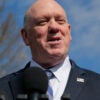A group of former Trump administration officials have formed America First Legal to stop the Biden administration’s executive actions and counter the radical left’s plans to transform our country.
Led by Stephen Miller, former White House senior adviser and director of speechwriting, America First Legal promises to turn the tables on the left, which used the court system to stymie some of former President Donald Trump’s key initiatives.
“The only difference between what happened to the Trump administration and what we are going to do is we’re actually going to have the law and the Constitution on our side,” says Matthew Whitaker, acting U.S. attorney general under Trump and one of those involved in the new organization.
The Daily Signal depends on the support of readers like you. Donate now
Whitaker joins “The Daily Signal Podcast” to talk about America First Legal’s plans and some of the biggest issues, including illegal immigration and Second Amendment rights, to emerge so far from the Biden administration.
Also on today’s show, we read your letters to the editor and share a good news story about a father and daughter who created a YouTube channel to empower special needs children.
Listen to the podcast below or read the lightly edited transcript.
Rob Bluey: We are joined on “The Daily Signal Podcast” today by Matthew Whitaker. He’s the former acting U.S. attorney general and now working with the group America First Legal. Matthew, it’s great to have you on the show.
Matthew Whitaker: I am so glad to be with you today, Rob.
Bluey: Well, can you begin by telling us about America First Legal? What’s your mission and what do you want to accomplish?
Whitaker: Yeah. America First Legal was formed by several former Trump administration high-ranking officials—including myself, Mark Meadows, Stephen Miller, and Russ Vought, and some others—to really advance and continue the policies through court action and legal proceedings of the Trump administration.
A lot of it’s going to be challenging the Biden administration’s administrative overreach and unconstitutional actions, whether they be in the areas of immigration, guns, D.C. statehood, and other things like that.
We’re going to be very active. It’s really going to be comparable to what you’ve seen during the Trump administration, the [American Civil Liberties Union] and other legal groups advancing.
Bluey: Your organization promises to use every legal tool at your disposal to defend our citizens from unconstitutional executive overreach. Well, in less than 100 days of the Biden administration, there’s certainly no shortage of examples. Where do you plan to begin?
Whitaker: Well, I think you’re going to see, in the next week, us jumping into several important areas of what the Biden administration is doing. I don’t want to hide the lead here, but I think you’re going to see some exciting efforts from our group.
You’re going to see us partnering with state attorneys general, other public interest litigation groups around the country to really challenge some of what the Biden administration is doing, but there’s so much more that they’re planning to do.
One of the things that happened during the Trump administration is the left was very effective in finding venues—whether it be in California or a couple other states like New York—to frustrate the president’s agenda. So I think you’re going to see us use similar tactics and means to get around the country.
The only difference between what happened to the Trump administration and what we are going to do is we’re actually going to have the law and the Constitution on our side and not just need a friendly venue.
So I think the long-term effects of our efforts are going to be great and they’re going to help maintain the republic, hopefully for another generation or two.
Bluey: I’d like to talk about some of those policy issues in just a moment, but you bring up an important point there. The left has regularly turned to the courts to get their way, particularly during the Trump administration, and you were right in the middle of many of those legal fights. What can conservatives learn from them and emulate?
Whitaker: I think some of the tactics that they employed were quite effective. I look at when they would have the similar lawsuits brought in three different jurisdictions, hoping to find the right judge that would give them a nationwide injunction. That was a very effective strategy.
And obviously, when one judge in one district in Southern California can put in a nationwide injunction, which I think is actually illegal under the federal rules of civil procedure, but nonetheless, they got those nationwide injunctions and obviously shut us down, and in many different fronts.
Like I said, we had litigation going on, especially, in California in the 9th Circuit—and it’s in the Northern District and Southern District of California—but we had a whole dedicated team to try to combat many of those lawsuits.
And while what we were doing has been verified, ultimately, by the Courts of Appeals or the Supreme Court as legitimate and legal, I think what you’re seeing [President Joe] Biden do is completely illegal and unconstitutional. And I think we’re going to have to be patient, pick our opportunities, and at the same time, be very aggressive in pursuing these cases.
Bluey: Some of those biggest legal fights came on the issue of immigration during the Trump administration. It’s certainly on the minds of many Americans today, given the border crisis that President Biden has created by dismantling so much of the Trump administration’s strategy. What can be done to restore the rule of law in that particular case?
Whitaker: Well, it’s a great question. Obviously, the immigration framework is broken. As I was right in the middle of it for almost two years, what I saw is just a patchwork of court opinions, consent decrees, and laws that intertwined to just make an absolute mess, where the effective and efficient administration of our immigration system was completely broken.
And I think what we bring at American First Legal is not only a keen understanding of how these things fit together—whether it be the public charge where you can’t, essentially, be on welfare and come into our country, you have to be able to support yourself; whether it be some of the stuff that’s happening with the children at the border; or whether it comes to border wall construction; all these areas—I think not only do we have an expertise, but we have a knowledge of the regulatory scheme that we advanced and the legality of it.
Obviously, a lot of our stuff was vetted thoroughly by the Office of Legal Counsel in the Department of Justice, and a lot of smart lawyers had already looked at it.
So I think this is where, again, we’re going to pick the right fights, but certainly, immigration is a place where this administration is doing things that are not only illegal, but are really, quite frankly, ham-handed and not very intelligent.
Bluey: Yeah. Certainly seems to lack a lot of common sense, particularly given the strategy that was in place seemed to be working quite effectively, and it’s just become such a problem now.
One of the other areas where I’ve seen Stephen Miller weigh in is the issue of Americans’ Second Amendment rights. We’ve seen the Biden administration make some noise about this early on. How can we ensure that Americans still enjoy the constitutionally guaranteed right to bear arms?
Whitaker: Well, this is probably the fight of our generation, in all seriousness. And I think this administration is going to try to regulate really everything about guns, whether that be just their appearance, whether they’re aggressive-looking and therefore assault weapons instead of rifles; or … magazine capacity; they’re going to regulate who can own them, how you can own them.
We’ve seen that the Supreme Court, I think, is fairly solid on Second Amendment issues. Every case that has finally made it to their desks, they’ve made sure that the Second Amendment is alive and well. But that isn’t going to prevent this administration from, ultimately, I think, just trying to grab Americans’ guns, especially AR-15s and AK-47s, and any other styled weapon that appears to be aggressive, even though, functionally, it’s the same as a hunting weapon.
Bluey: You mentioned that Russ Vought, President [Donald] Trump’s former director of the Office of Management and Budget, is involved with America First Legal. Of course, for us, as a Heritage [Foundation] alum, we are grateful for his work.
One of the things that he did in conjunction with President Trump was end critical race theory trainings throughout the federal government. Of course, President Biden made that one of his first actions, to reverse President Trump’s decision.
But what can federal employees do if they’re forced to participate in these programs? And is there anything that we as Americans can do to ensure that our tax dollars aren’t spent in this way?
Whitaker: Yeah, this is another area of the battlefield that we’re going to have to pursue because this critical race theory, you know, essentially, [is] something that says that certain races are superior to others.
I mean, it is inconsistent with American tradition and American law, and I think we have to continue to make sure that not only are federal employees not subjected to this type of training and indoctrination, but ultimately that taxpayers aren’t paying for it.
The federal government is big, inefficient, and the last thing we need is people wasting their time on academic theories that really are inconsistent with the human experience. So I think this is something that we’ll find an opportunity to insert in and make sure that the American people are fully represented in that.
Bluey: Your group, of course, uses the name America First Legal. “America First” is a term that President Trump, of course, spoke about frequently, and there are so many people who were involved in the Trump administration who are now trying to make sure they carry a lot of those policies forward.
How do you plan to work with others in the conservative movement to make sure you’re advancing and continuing to pursue those policies and strategies in a way that is effective?
Whitaker: Yeah, well, we have those relationships. There have been several groups that have also been set up—whether it’s Ben Carson’s group, whether it’s Brooke Rollins who ran the Domestic Policy Council, Russ obviously has his own group that’s going to do some important policy work—and obviously, we’re all familiar with each other, we have great relationships, and we’re going to talk about these kinds of things to see how we can advance that America First agenda.
I think President Trump really understood where the American people and most importantly, where the American worker could be benefited by better policies, whether they’re trade, whether they’re tax policies; whatever the area, the president was laser-focused on some of these key issues that really would set America up to be successful for the next generation.
And I think we need to protect those policies, to advance those policies, and to, at the same time, where we can, support politicians that share our view. So that’s, I think, one of the areas that this ecosystem that we’re all part of ultimately is going to need to be smart and tactical at the same time, but understand the long-term strategy.
Bluey: Well, thank you for the work you are doing.
Shifting gears a bit, you served as a former U.S. attorney for the Southern District of Iowa, before becoming chief of staff to Attorney General Jeff Sessions and then acting attorney general yourself. What are you most proud of accomplishing during your time in government?
Whitaker: You know, I think I have always tried to work hand-in-hand with state and local law enforcement, whether that’s the police or the sheriff’s deputies, to protect the most vulnerable.
I do believe that every child has a right to play in their front yard without fear of violence or violent crime affecting their lives, and so we need to continue to get the trigger pullers and the most violent, aggressive people off of our streets and put them behind bars for a long time. And I think I’m proud of that.
I’m proud of the work we did in the First Step Act. I think that was an important reset on some of our criminal justice efforts and incarceration policies.
I’m proud of, also, the way with which we were able to navigate some of these challenges at the border. The Department of Justice has all the immigration judges. We were able to change, in many cases, some of the law, so that some of this asylum fraud could be eliminated.
So there were so many, Rob. We could talk about all the accomplishments probably all day. There’s just so much we accomplished.
And at the Department of Justice, we were always at the front seat and [had] a clear view to that, but it was just an honor of a lifetime to serve in this administration. I have the upmost respect for my colleagues, and also, I just admire the president and what he was able to accomplish, and I want to continue that legacy.
Bluey: Well, certainly, we’ve talked a lot about the courts and the impact, and what you’re planning to do with America First Legal. One of President Trump’s most significant accomplishments was the number of judicial appointments he was able to make in his term in office.
How significant were they, in your opinion, and what will it mean for the next generation really when you have these legal battles going through district courts, appellate courts, and even the U.S. Supreme Court?
Whitaker: Yeah. I think it’s significant. Many of those folks that were appointed to judgeships I know personally because they were at the Department of Justice or at the White House, or otherwise I knew them through conservative legal circles.
One of the things that I can tell you is that now, in the 9th Circuit—which was the most difficult, you know, California, Washington, Oregon district circuit, which is the appellate court—you can now draw a majority conservative panel, which you never could up until Donald Trump appointed some judges.
I have at least one on the 9th Circuit that was on my staff that’s a really good conservative judge, and it’s exciting to know that we put over 300 judges in those seats.
I don’t think anybody can suggest that the three that were put on the Supreme Court weren’t rock-ribbed conservatives that are going to judge based on what the law is, not the political agenda that they’re trying to advance. So I’m excited about what we did at the Supreme Court as well.
Bluey: And finally, I have a sports question to ask you. You were an Academic All-American while playing tight end for the Iowa Hawkeyes. It certainly was a different time in sports when you were involved; politics didn’t seem to dominate every conversation or you weren’t getting political alerts from ESPN. What do you think about the trend of athletes engaging in some of these highly charged political debates?
Whitaker: Well, I’m concerned. I think American people look at sports as their place where they can sort of put the world behind them and be entertained, and so it’s concerning.
I look at what LeBron James just did by posting a picture of a police officer and suggesting that that police officer is next; it seemed like, not a veiled threat, just a general threat.
We see athletes wanting to engage politically. I think, oftentimes, unfortunately, these athletes come off as highly uninformed. They don’t understand the political landscape in the United States of America. They don’t have the context for some of these highly charged issues.
And I think that’s what concerns me because, I mean, I do love sports, I love especially college football, and I just don’t want to have a toxic environment in sports where we’re immediately turned off by athletes and what they have to say.
I mean, I think it’s very dangerous, especially as a college athlete, to speak out when you have no life experience other than your unique experience. It’s a very small world and I think some maturity certainly would help. I know for me, it took some real education in politics, public policy, and the like that I didn’t have as a college athlete.
I think, at the same time, every American citizen has a First Amendment right to speak out. I just wish they were more informed and more knowledgeable on the issues before they did speak out.
Bluey: Well, I couldn’t agree more. I think that it’s so important for that to happen. And I think you made a great point there; that Americans often turn to sports as a way to focus on something else other than politics.
I think that’s why so many, I think, conservatives struggle with Major League Baseball’s decision to make a very political move of moving the All-Star Game out of Atlanta and why you’re seeing, at least in public opinion polls, so many conservatives now saying that they’re either going to boycott or tune out Major League Baseball.
This move by corporations or big entities like that to bow to the pressure from the left, it’s certainly a concern, and I think it’s something that we all need to be aware of and push back on when we can.
Whitaker: I totally agree. Obviously, the situation with Major League Baseball has not aged well. By taking that significant amount of economic development out of the city of Atlanta and moving it to the city of Denver, really, there’s no doubt that it hurt minorities and it hurt people that would have benefited from that game there. And I think that, obviously, it politicized Major League Baseball when some of us just want to cheer for our home team.
Bluey: That’s absolutely right.
Well, Matthew, let’s leave it there. Again, the group is called America First Legal. Appreciate the work that you and Stephen Miller and the entire team are doing there. We look forward to keeping a close eye on it at The Daily Signal and wish you all the best.
Whitaker: Yep. Go to aflegal.org if you want to learn more. Thank you.






























